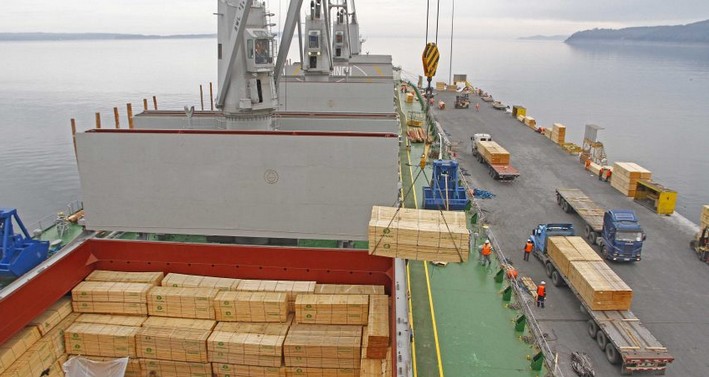- This follows the government's announcement of a regional plan in response to the shutdown of the historic steel mill in Talcahuano.
Various industry associations in the Biobío Region are closely monitoring the government's announcement of an action plan to address the labor consequences expected from the closure of the Huachipato Steel Company.
During a meeting between Economy Minister Nicolás Grau and steelworkers' unions after the gradual shutdown was confirmed, the minister stated, "In the coming days, as a government, we will announce a plan to economically address this Region, focusing on generating employment—ideally in quality manufacturing—to provide labor prospects for Huachipato workers beyond their potential severance or agreements with the company, a process in which we will also support them."
When asked for details about the plan mentioned by the Economy Minister, Presidential Delegate Daniela Dresdner, after a meeting with the Employment and Industry Defense Board, said, "Until we finalize the plan, which depends on discussions, we won’t disclose its aspects. This isn’t a plan developed solely by the government but one we are crafting jointly with business associations, workers, and employees."
In this context, manufacturing associations in the Region shared their views on what this soon-to-be-detailed government plan should include to revitalize Biobío's economy and create more jobs.
Alfredo Meneses, General Manager of the Biobío Manufacturing Exporters Association (Asexma), said, "When discussing a regional plan, the first step should be asking the regional governor or government about the regional development strategy. Significant resources have been invested across different administrations in strategy after strategy, and I understand one exists today. So, I don’t see why a new regional plan is being considered when a regional development strategy should already be in place."
"Second, any strategy (or regional plan) undoubtedly requires resources—both public and private—where public funds typically incentivize private investment. Therefore, beyond having a strategy or plan, what’s needed is the coordinated alignment of all public services that will support this plan or strategy in the Region," he added.
Meneses also highlighted sectors like fishing, "which operate under uncertainty due to an unresolved law," and forestry, "so vital to the Region, which also faces instability. This plan must cover all sectors, not just some, and address bureaucratic hurdles."
Manufacturing Exports
Asked what the regional economic revitalization plan should include to improve manufacturing exports, Meneses said, "Deep incentives are needed for small and medium forestry enterprises, as most lack support, leading many to stop exporting. Without incentives, like for plantations, this sector has declined sharply and risks exiting the market. The export sector specifically requires updated regional logistics."
He added, "Public Works Ministry investments have been sporadic, usually decided centrally with little local input. Our foreign trade logistics are at least 20 years behind, so we must envision the development required to boost exports across sectors. Undoubtedly, Carriel Sur must become a cargo transfer hub for international markets."
Michell Esquerré, President of Pymemad, confirmed the tough situation for small and medium forestry enterprises. "One way to create jobs (in forestry) is promoting small and medium landowners' plantations, where supply is needed. Also, without revising SME classification systems, we won’t understand these businesses' dynamics. Short-term, to boost the regional economy, we must combat informality and support forestry SMEs by decentralizing the market through plantation incentives."
Specifically, Esquerré proposed, "The state should revive past support, offering $1 million per hectare for small and medium landowners to plant. This creates jobs, nurseries, and must be direct—landowner to state, bypassing intermediaries or banks—similar to Decree 701 but better structured to ensure planting occurs on suitable forest lands, focusing on territorial development in Santa Juana, Coelemu, or poorer municipalities."
"For every million invested by the state—possibly financed by the Inter-American Development Bank—within 15–20 years, through VAT and income taxes, the state recovers double its investment. So, supporting small and medium landowners is a good deal for the state," Esquerré added.
Álvaro Ananías, President of CPC Biobío, stressed that the plan announced by Economy Minister Nicolás Grau must "revive the forestry sector, which is in crisis yet accounts for 70% of the Region’s exports and over 100,000 jobs in Biobío. Right now, forests aren’t being replanted due to a lack of incentives for small and medium landowners to reforest."
"Let’s not forget that over 200 sawmills have closed in the last decade, with significant job losses," Ananías added.
The CPC Biobío leader also noted, "The fishing sector is important from two angles. First, we must halt bills harming employment and Biobío’s industrial culture. We must be cautious with the new fishing law, as it has stalled sector investments. Second, we have immediate measures to revive regional fishing jobs, like restarting industrial jumbo squid fishing. The squid law reduced catches by over 50%, closing many processing plants and costing 1,000+ jobs."
Source:diarioconcepcion.cl







Comments (0)
No comments yet. Be the first to comment!
Leave a comment